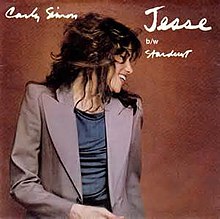
"You're So Vain" is a song written in 1971 by Carly Simon and released in November 1972. It is one of the songs with which Simon is most identified, and upon its release, reached No. 1 in the United States, Canada, Australia, and New Zealand. The song is ranked at No. 92 on Billboard's Greatest Songs of All Time. "You're So Vain" was voted No. 216 in RIAA's Songs of the Century, and in August 2014, the UK's Official Charts Company crowned it the ultimate song of the 1970s. In 2021, the song was ranked 495th on Rolling Stone's 500 Greatest Songs of All Time.

Walking Man is the fifth studio album by singer-songwriter James Taylor. Released in June 1974, it was not as successful as his previous efforts, reaching only No. 13 on the Billboard Album Chart and selling 300,000 copies in the United States. Until 2008's Covers, it was Taylor's only studio album not to receive a gold or platinum certification from the RIAA.

Another Passenger is the sixth studio album by American singer-songwriter Carly Simon, released by Elektra Records, on June 5, 1976.

No Secrets is the third studio album by American singer-songwriter Carly Simon, released by Elektra Records, on November 16, 1972.

Playing Possum is the fifth studio album by American singer-songwriter Carly Simon, released by Elektra Records, on April 21, 1975.

The Best of Carly Simon is singer-songwriter Carly Simon's first greatest hits album, released by Elektra Records, on November 24, 1975. Covering the first five years of her career, the compilation includes eight top twenty hit singles from her first five albums, as well as two album cuts from No Secrets (1972), "Night Owl" and "We Have No Secrets", the latter of which was released as the B-side to the single "The Right Thing to Do".

Boys in the Trees is the seventh studio album by American singer-songwriter Carly Simon, released by Elektra Records, in April 1978.
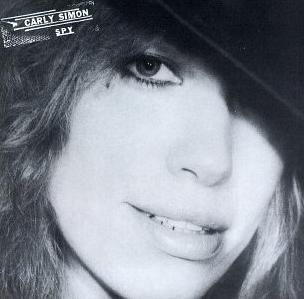
Spy is the eighth studio album by American singer-songwriter Carly Simon, released by Elektra Records, on June 30, 1979.
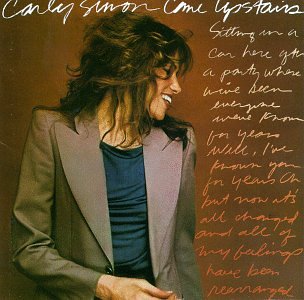
Come Upstairs is the ninth studio album by American singer-songwriter Carly Simon, released by Warner Bros. Records, on June 16, 1980.
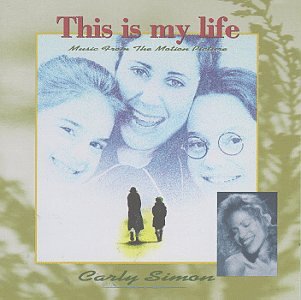
This Is My Life is the soundtrack album to the 1992 Nora Ephron film This Is My Life, released by Qwest Records, on April 14, 1992.

"Don't Let Me Be Misunderstood" is a song written by Bennie Benjamin, Horace Ott and Sol Marcus for the American singer-songwriter and pianist Nina Simone, who recorded the first version in 1964. "Don't Let Me Be Misunderstood" has been covered by many artists, most notably by The Animals, whose blues rock version of the song became a transatlantic hit in 1965. A 1977 four-on-the-floor disco rearrangement by the disco group Santa Esmeralda was also a hit, while the 1986 cover by new wave musician Elvis Costello found success in Britain and Ireland.

"Don't Let the Sun Go Down on Me" is a song written by English singer Elton John and his lyricist Bernie Taupin. It was originally recorded in 1974 by Elton John for his studio album Caribou and was released as a single that peaked at number two on the Billboard Hot 100 chart and reached number 16 on the UK Singles Chart. The song found further success in 1991 in a live cover version recorded as a duet between John and George Michael – who performed the song together for the first time at Live Aid in Wembley Stadium in July 1985 – which reached number one in the UK and US.

The discography of Carly Simon, an American singer-songwriter, musician, and children's author, consists of 23 studio albums, one live album, nine compilation albums, one Christmas album, four soundtrack albums, one audiobook, and 41 singles, on Elektra Records, Warner Bros. Records, Epic Records, Arista Records, Rhino Entertainment, Columbia Records, Hear Music, and Iris Records, with special releases on Qwest Records, Angel Records, Walt Disney Records, and Macmillan Audio. These lists include all live and studio albums, and the motion picture soundtracks list includes albums containing more than 50% of music by Simon. In the United States, she has five Platinum-certified albums, three Gold-certified albums, and four Gold-certified singles. In the United Kingdom, she has three Gold-certified albums, two Silver-certified albums, as well as one Gold-certified single, and one Silver-certified single. All but three of her studio albums have charted on the Billboard 200, with 12 charting in the Top 40, and five in the Top 10. Two of her compilation albums have also charted in the Top 40. Apart from her album successes, she also has amassed 24 Billboard Hot 100 singles, with 13 of them hitting the Top 40, and 28 Billboard Adult Contemporary chart singles, all charting in the Top 40. Four of her singles have been certified Gold by the US RIAA: "You're So Vain", "Mockingbird", "Nobody Does It Better", and "Jesse". "You're So Vain" has been certified Gold by the UK BPI, while "Nobody Does It Better" been certified Silver.

"Lotta Love" is a song written and recorded by Neil Young and released on his 1978 Comes a Time album. "Lotta Love" was also covered by Nicolette Larson in 1978. Larson's version reached No. 8 on the Billboard Hot 100 chart and No. 8 on the Cash Box Top 100 in February 1979. It also hit No. 1 on the Easy Listening chart and was a hit in Australia and New Zealand.
"Mockingbird" is a 1963 song written and recorded by Inez and Charlie Foxx, based on the lullaby "Hush Little Baby".

"You Belong to Me" is a song written by American singer-songwriters Carly Simon and Michael McDonald. Originally recorded by McDonald's rock group The Doobie Brothers for their seventh studio album, Livin' on the Fault Line (1977), the song was made famous by Simon when she recorded it for her seventh studio album, Boys in the Trees (1978). A live version of the song from The Doobie Brothers' 1983 album Farewell Tour would later chart on the Pop Singles chart at No. 79 in August 1983.

"The Right Thing to Do" is a song written and performed by Carly Simon that first appeared on her 1972 album No Secrets. The song was recorded at Trident Studios in London's Soho. It was released as the second single to the album, following "You're So Vain" and reached No. 17 on the Billboard Hot 100 and No. 4 on Billboard's Adult Contemporary chart. It also reached No. 20 on the Canada Top Singles chart and No. 9 on the Canadian Adult Contemporary chart. It reached No. 17 in the UK.
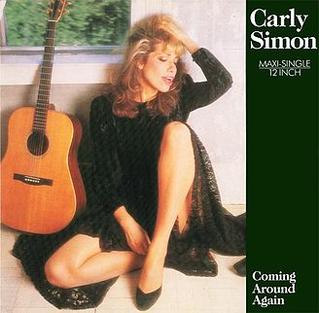
"Coming Around Again" is a song by Carly Simon, written for the film Heartburn (1986) and later from the album of the same name, Coming Around Again (1987). Released as a single in 1986, it became one of Simon's biggest hits, peaking at No. 18 on the US Billboard Hot 100 and No. 5 on the Billboard Adult Contemporary chart. It was also a top-10 hit in Austria, the Netherlands, Sweden, and the United Kingdom.

"Attitude Dancing" is a song written by Carly Simon and Jacob Brackman, performed by Simon and produced by Richard Perry. The song served as lead single from Simon's fifth studio album, Playing Possum (1975).

"One Man Parade" is a song written by James Taylor that was first released as the first track on his 1972 album One Man Dog. It was also released as the second single from the album, following up on the Top 20 hit "Don't Let Me Be Lonely Tonight," after receiving significant airplay as an album track. The single was issued twice with two different B-sides, "Hymn" and "Nobody But You." It did not achieve the same chart success as "Don't Let Me Be Lonely Tonight," peaking at #67 on the Billboard Hot 100. It also charted on the Adult Contemporary chart in Canada, reaching #55. In some regions, such as in Europe, it was released as the B-side of the single release of "One Morning in May."
